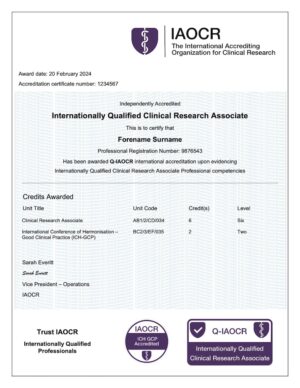FOR IMMEDIATE RELEASE
London, UK – July 5th, 2024 – IAOCR, the global leader in clinical research competence verification and certification, has released new insights on the alarming rise of fraudulent Clinical Research Associate (CRA) applicants. Recent data reveals that over 40% of CRA applicants are submitting falsified credentials, posing significant risks to the integrity of clinical trials.
Jacqueline Johnson North, CEO of IAOCR empathizes, “The integrity of clinical trials is paramount. Identifying and eliminating fake applicants is crucial to maintaining trust and ensuring the safety and efficacy of clinical research. The gravity of this issue needs to be taken seriously, that is why we are working with recruitment experts and employers to raise awareness on how to embed best practices that reduce risk to patients, valuable research and organizational reputation. To help combat these challenges, IAOCR offers the Internationally Qualified Clinical Research Associate (Q-IAOCR) Accreditation.”
Joining forces with Angela Roberts, Co-Founder and Managing Partner of craresources, IAOCR advises hiring managers to be mindful of the following five key trends:
- Is the company listed real? Use resources like OpenCorporates and state registrars to verify the existence of the company.
- Do employment dates match the company’s history? Ensure that the employment dates align with the company’s operational period and acquisition history to detect inconsistencies.
- Is the salary request unusually low? Candidates asking for significantly lower salaries might lack industry experience or be attempting to deceive.
- Is the consulting experience described clearly? Legitimate CRAs should transparently discuss their projects and clients. Vague descriptions can be a red flag.
- Does the candidate have a digital footprint? Genuine CRAs typically have a presence on LinkedIn or other professional platforms. Absence of this can indicate potential fraud.
Angela Roberts affirmed, “we are on a joint mission with the International Accrediting Organization for Clinical Research to improve industry standards and reduce fraud. Identifying the ‘Fake CRA Candidate’ trend is our business because networking with CRAs is our business. But don’t be misled, the CRA role isn’t the only one plagued with fraudulence. The FBI speculates that we are living in what they are calling the Golden Age of Fraud. And the feedback I am receiving aligns with that. One CRO just told me that 70% of their CRA applicants were fake. Another company told me that 90% of their project manager candidates were fake.”
For detailed insights and a checklist to help identify fraudulent CRA applicants, read Angela Robert’s expert tips on Ways to Spot Fake Job Applicants.
The Internationally Qualified Clinical Research Associate (Q-IAOCR) Accreditation program provides assurance of competency and integrity for individual CRAs, eliminating any doubt from potential employers. The certification validates the competence of CRAs and reassures sponsors, CROs, and patients that the highest standards of quality and ethics are being upheld:
- Professional Certification: Awarded the title of Internationally Qualified Clinical Research Associate (Q-IAOCR)
- Independent Verification: Ensures robust accreditation through a unique two-step verification process
- Unique Registration Number: mapped to student details and award date
- Certificate of Accreditation: access to electronic Professional Accreditation Mark badge
- International Professional Recognition: Mapped to UNESCO’s International Standard Classification of Education framework
For more information on the CRA accreditation program, please visit Clinical Research Associate Certification.
About IAOCR: IAOCR is the only organization in the world providing truly internationally recognizable, robust, and meaningful professional accreditation of clinical research professionals, training programs, and companies based on competence. Our mission is to minimize risks to patients, clinical trials, and commercial activities by improving the quality and performance of clinical research workforces.
For interviews and further information contact:
WLW FUTURE PRESS RELEASE DISTRIBUTION
news@wlwfuture.com
+44 800 160 1810
ENDS









